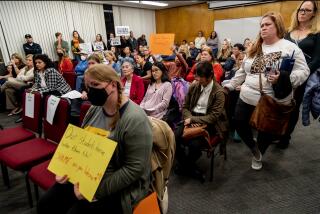Not to Worry, Say County’s Schools Officials
- Share via
In contrast to a federal study released Wednesday that says one-third of the nation’s schools and colleges are unprepared for the year 2000’s effect on technology, officials with Orange County school districts and colleges say they are ready for any potential problems when the final calendar page of the century turns.
County schools began crafting plans at least a year ago--and some as far back as 1994--to prepare for 2000. District officials say the schools that the federal Department of Education is worried about are institutions in less developed, and less moneyed, areas of the country.
“It’s hard for me to imagine that people have not responded to what might happen. I can’t believe people would be out of the loop on this one. . . . We’re not,” said Dean Waldfogel, deputy superintendent of the Irvine Unified School District. “We’ve made all the changes in operating systems. Changes in our applications. Our administrative software. Students’ records. Payroll.”
According to the federal study, the worst-case scenario on the first day of school in 2000 is that 15%--or 12,000--of the nation’s schools still will be unprepared and that schoolchildren could return from winter vacation to find their schools closed or their heating systems, cafeteria freezers and security systems failing.
Despite optimistic predictions about overall preparations for Y2K, the Clinton administration has warned that schools, some cities, small hospitals and small businesses are foot-dragging on contingency plans for computer failures. The changeover to 2000 could disrupt some computer programs because they were originally written to recognize only the last two digits of a year and thus could read the digits “00” as 1900 instead of 2000.
Except for such things as microwaves and coffee makers in faculty lounges--nonessential equipment, in other words--officials with Orange County schools and colleges say the basics are accounted for.
“We did all our final testing in May,” said Mike Yanez, executive director of information technology services for the Rancho Santiago Community College District. “All of our system was converted in March. We focused on all of the things that would have a direct impact on our financial systems and health and safety. Our electrical systems are upgraded. Our elevators. We are ready to go.”
Alfonsina Davies, assistant superintendent for Educational Support Services in the Santa Ana Unified School District, said the district has been planning for Y2K for about a year now. “We are prepared for this,” she said. “This is not a new topic. The district has for a long time been looking at what needed to be done, and we’ve done it.”
Connie Duddridge, supervisor of Risk Management for Newport-Mesa Unified, said the district bought 20 personal computers just in case things go wrong. What’s more, on the first day of school, campuses are planning on sandwich lunches with nonperishable beverages. “We’ve taken the time to look at everything,” she said. Worst case, if the school needs to close, “we can put up a sign. . . . But we’re ready. We are prepared.”
Steven Glyer, director of Educational Technology with Newport-Mesa, said the image of schools shutting down without power and the ability to transport children “is not within our realm of possibility.”
The Education Department’s survey suggests there’s little for the lagging schools to do now but prepare as best they can for the possible glitches.
Without the fixes, any information that relies on a date could experience a year’s-end failure. Conceivably, heating systems could fail, cafeteria freezers could shut down, teacher paychecks could be held up and student records could be corrupted.
The Associated Press contributed to this report.
More to Read
Sign up for Essential California
The most important California stories and recommendations in your inbox every morning.
You may occasionally receive promotional content from the Los Angeles Times.













